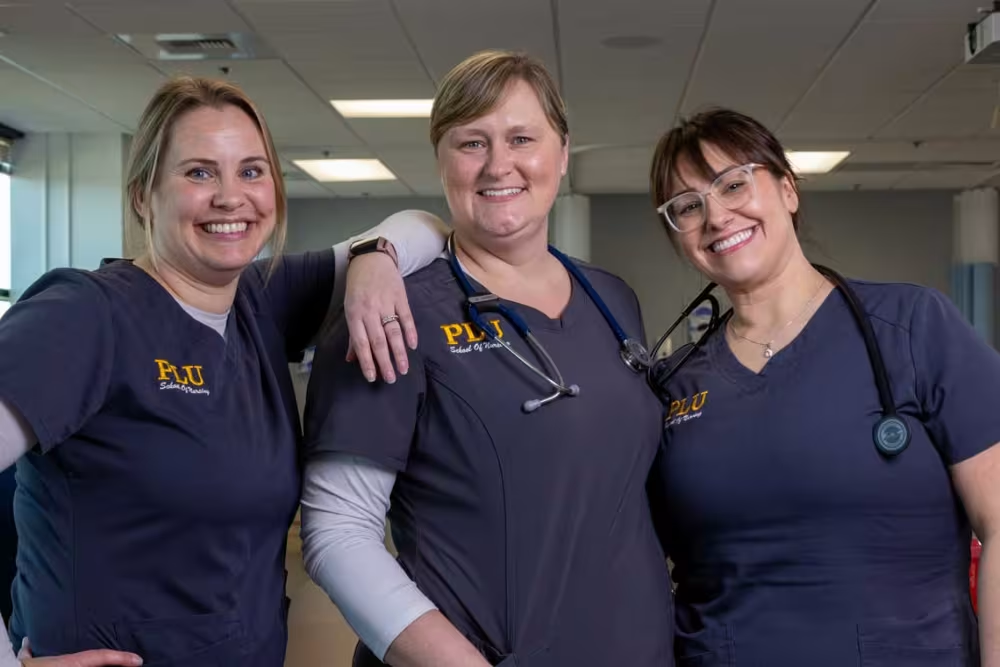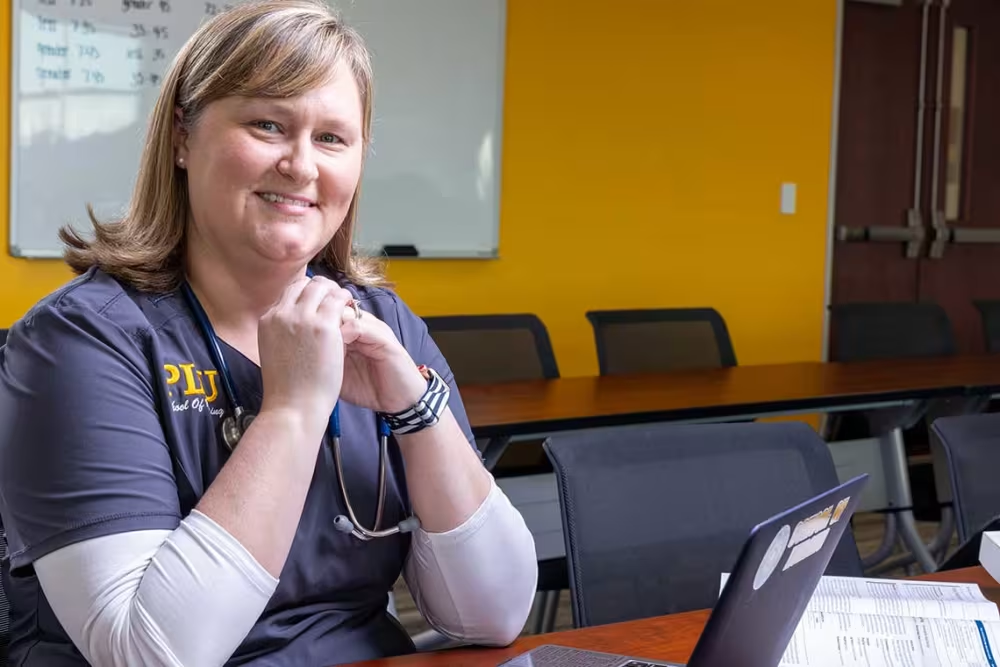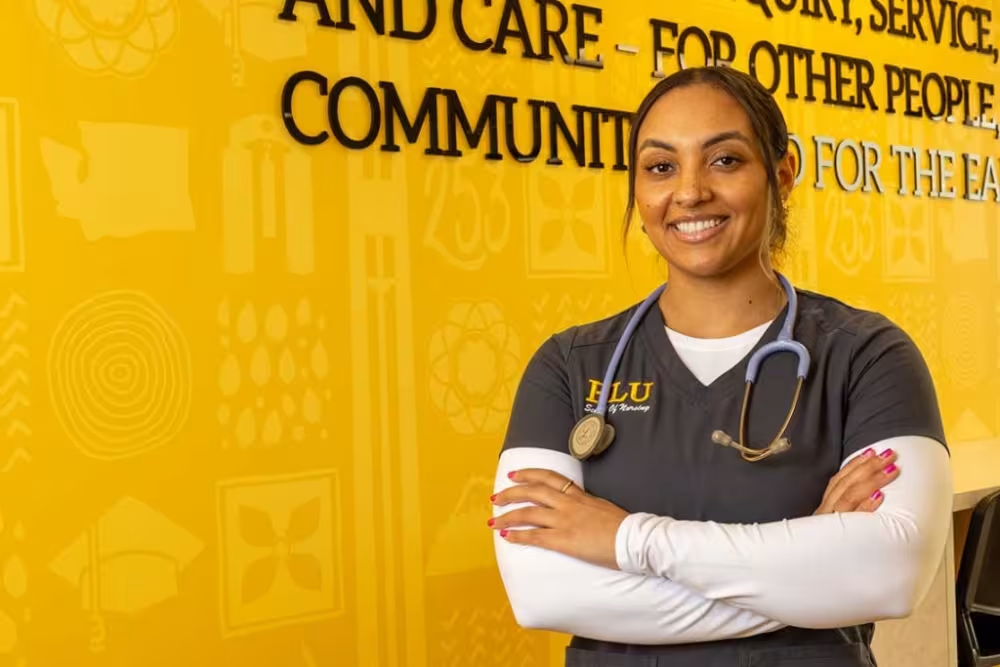Nursing as a Second Career: 7 Questions to Ask Yourself
Each blog post is dated and contains accurate information as of that date. Certain information may have changed since the blog post’s publication date. If you would like to confirm the current accuracy of blog information, please visit our ABSN overview page or contact admissions at (866) 891-9308.
Choosing nursing as a second career is a smart decision for many reasons. Nursing offers professional and career advantages as well as many specialty options. There are certain admission requirements for accelerated programs, but as a second-career student, you're likely better suited to conquer the challenges and succeed.

If you’re dreaming of a career that makes a difference and are considering becoming a nurse, even if you’ve spent years in another field, it’s not too late to make the leap. Nursing isn’t just for those fresh out of high school. It’s well within reach, no matter your background or profession.
With the Accelerated Bachelor of Science in Nursing (ABSN) program at Pacific Lutheran University (PLU), becoming a nurse is an achievable goal if you’ve been working in another field. You likely do not want to spend years going back to school. With an accelerated program, you can earn a BSN in as few as 16 months.
Becoming a nurse could be the right career move for you if you have a passion for helping people, are determined, and want a career with security and advancement opportunities.
Why Choose a Career Change to Nursing?
Nursing is an ideal field for career changers because it offers so much opportunity and personal satisfaction.
Benefits of Becoming a Nurse Later in Life
Becoming a nurse after being in the workforce in another field offers several advantages. It can set you on a new, meaningful, and rewarding career path. You will also come into the profession with a unique background, perspective, and skills gained from past work experience. Benefits of choosing nursing can include:
- Ability to make a difference in people’s lives
- Career advancement opportunities
- Competitive salary and benefits
- Job security
- Skill development
- A variety of specialties to choose from
Nurses also have variable scheduling options. They can choose a position with weekday, weeknight, or weekend hours. For example, many full-time nurses work three 12-hour shifts a week, and then the rest of their time is available for relaxation or time with family.

Demand for Nurses in the Healthcare Industry
There is a great demand for nurses in the U.S. The National Center for Health Workforce Analysis projected a more than 300,000 registered nurses (RNs) shortage in 2036. According to the U.S. Bureau of Labor Statistics, RN employment is expected to grow 6% between 2023 and 203 3, faster than the national average for all occupations. Meanwhile, the BLS projects employment for Advanced Practice Registered Nurses (APRNs) to jump 38% during that time.
Personal Fulfillment and Job Stability
As a BSN-prepared nurse, you can have confidence that your knowledge will be needed. Various nursing jobs are available in diverse settings, from hospitals to schools. As a nurse, you can take pride in knowing that:
- Your care will help improve patient outcomes
- You will contribute to high-quality health care service and patient safety
- You will be a part of a highly skilled team
- You will help solve problems
- You will have a level of autonomy
Along with emotional support, nurses also provide life-saving care. They can experience personal satisfaction when they watch their patients gain strength and make improvements. Contributing to a patient’s health care journey and recovery is truly meaningful work.
In addition to fulfillment, nursing offers excellent growth opportunities such as management or leadership roles, advanced degrees, and certifications.

Is Nursing a Good Fit for Your Second Career?
Before making a career change to nursing, consider how your skills and personality align with the profession.
Skills That Transfer Well to Nursing
You likely have learned valuable skills in your previous roles that would transfer to nursing. They can include:
- Communication
- Customer service orientation
- Leadership
- Problem-solving
- Science and technology aptitude
- Teaching
Key Traits for Success in Nursing
To be successful as a nurse, you need personality traits that will help you navigate this demanding yet rewarding career. Do any of the following qualities describe you?
- Adaptability
- Attention to detail
- Commitment to lifelong learning
- Critical thinking
- Empathy and compassion
You probably developed many of these traits in your previous jobs that would serve you well as a nurse.

Addressing Common Concerns: Time, Cost, and Effort
It’s true that nursing school is an investment with a rigorous curriculum, requiring time and effort. The good news is that if you already have college credits or a bachelor’s degree, an accelerated nursing program can allow you to graduate in less time.
Mastering the Curriculum
The nursing school curriculum offers a mix of coursework, skills labs, and clinical rotations and requires much of your time ; however, professors, staff, and peers provide ample support during the program.
Several strategies will help you navigate nursing school with confidence:
- Creating a detailed schedule of all your nursing school activities and deadlines
- Gathering a strong support team
- Studying with a group of peers
- Taking initiative by asking your instructor questions early
- Using various study methods
Learning how to excel in nursing school takes time, but with hard work and dedication, you can master the curriculum.
Financing Your Education
Financing your education will take some planning. Be sure to research options for grants, scholarships, and loans from the federal or state government and organizations. Start by visiting our tuition page or contacting our financial services team. Note that you will need to avoid working full-time while in the program.

Are you wondering how to pay for nursing school? Learn how.
Steps to Transition to Nursing
If you are ready to start your nursing journey, there are several steps you will need to take to bring your dream to fruition. Common steps:
- Research nursing programs to find the right fit for your lifestyle.
- Speak with the admissions team to determine your eligibility and create the best application possible.
- Complete an accredited nursing program, in which you will gain experience through labs and clinicals.
- Pass the NCLEX-RN exam and become a registered nurse.
Researching Accelerated Nursing Programs (ABSN)
While accelerated nursing programs allow students to earn a degree in less time, the curriculum is similar to traditional four-year baccalaureate programs.
Pacific Lutheran’s ABSN program makes it possible for students with at least 60 non-nursing college credits or a non-nursing bachelor’s degree to earn a BSN in as few as 16 months. It also offers three start dates each year in February, June, and September.

Meeting Nursing School Requirements
Getting into nursing school is competitive. Before applying , you will want to make sure you meet all the requirements. The first step is to contact the admissions team.
During your conversation with a PLU admissions representative, we will determine your eligibility for the program and help you create a plan for taking any incomplete or expired prerequisites.
PLU ABSN program requirements:
- 60 non-nursing college credits or a non-nursing bachelor’s degree
- Minimum grade of B- in each prerequisite course
- Minimum cumulative GPA of 3.0
Prerequisites include:
- Intro to Microbiology
- Human Anatomy & Physiology I and II with labs
- Chemistry of Life
- Development Across the Lifespan
- Introductory Statistics
- Nutrition in Healthcare
Once your requirements are met, we will help you through the application process.
Gaining Experience Through Clinical Rotations
A nursing program’s curriculum will include coursework covering nursing theory and concepts and skills and simulation labs. In clinical rotations, you will gain practical experience caring for patients.
PLU’s ABSN program clinical learning experiences begin in the first semester, and students are placed at respected facilities in the Seattle area, from hospitals to long-term care facilities to outpatient clinics. You will also actively care for patients in different areas of nursing practice, such as adult health, women and children, critical care, community health, and mental health.
The goal is to help you become a confident, practice-ready nurse.
Learn more about how PLU's Accelerated BSN program in Seattle works.

What Are Your Career Options After Graduation?
After graduating with a BSN, you will be eligible to enter a variety of practice areas. Whether in the clinical or non-clinical realm, nurses with a BSN can choose a specialty that fits their interests and goals.
Here are a few of the many areas where nurses can work:
- Emergency departments
- Hospital units
- International health care missions
- Nursing homes
- Outpatient clinics
- Health care research centers
- Schools
- Surgical centers

Start Your New Path at Pacific Lutheran University
If you have a passion for people, a caring heart, and a desire to learn, nursing may be the ideal career for you. Pacific Lutheran University’s ABSN program is built around three key components:
- Online courses – Learn foundational nursing information in a flexible and adaptable online learning environment.
- Skills and simulation labs – Learn and practice hands-on nursing skills in person with small groups of peers and instructors.
- Clinical rotations – Develop real-world patient care skills through clinical experiences at top regional health care organizations.
To learn more about the ABSN program at PLU, reach out to our admissions team. Together, we can create a plan for achieving your goals and starting a rewarding new vocation.
